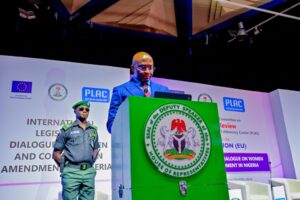Special Seats: Kalu Calls For Removal Of Barriers Toward Women’s Political Advancement

The Deputy Speaker of the House of Representatives, Hon. Benjamin Okezie Kalu has strongly advocated for the removal of barriers that hinder women’s political advancement in Nigeria.
He said that giving women opportunities to participate in the parliamentary activities and in the governance processes will not only birth a legislature that reflects the diverse makeup of Nigerian citizenry and values but also bring immense benefits to the general society.
Kalu made the call while delivering his welcome address at the International Legislative Dialogue on Women and Constitution Amendment in Nigeria organized by the House of Representatives Committee on Constitution Review in collaboration with Policy and Legal Advocacy Centre (PLAC) with support from the European Union (EU) in Abuja on Monday.
Kalu who is also the Chairman of the House Committee on Constitution Review bemoaned the poor number of women fielded as candidates in the last 2023 general elections.
According to him, having 1,552 as women in the elections that produced 15,307 candidates by 18 political parties was not encouraging in any way.
The Deputy Speaker therefore called for support to the gender bills that are before the parliament to ensure that the women are given an opportunity to make their contributions to the political development of the country.
He said: “I am honored to lead the House Committee on Constitution Review, where we have proposed bills aimed at correcting the gender imbalance within government at all levels. One such critical bill, “A Bill for an Act to Alter the Provisions of the Constitution of the Federal Republic of Nigeria, 1999 to Provide for Seat Reservation for Women in the National and State Houses of
Assembly” (HB 1349), alongside four other gender justice bills, are under
consideration.
“This proposed legislation is designed to remedy the low representation of women by creating additional seats specifically for female candidates in national and state legislatures.
“The bill reflects a pragmatic approach by proposing a temporary
measure—an approach that has worked effectively in other countries to fast-track women’s representation in governance. These reserved seats are not a permanent fix but are structured as a “Temporary Special Measure,” subject to review after four general election cycles, or 16 years. At that time, stakeholders will assess whether the measure should continue, be adjusted, or be phased out based on progress made.
“We see this approach as essential within Nigeria’s electoral system, which is largely based on a First-Past-the-Post model. Unlike proportional systems where party-based gender quotas can result in direct outcomes, our model presents challenges in implementing such quotas effectively.
“Special seats, therefore, offer a feasible solution to ensuring that women not only participate as candidates but are also represented meaningfully within our legislative institutions.
Furthermore, we must view the financial investment in women’s inclusion as a direct investment in Nigeria’s future.
“Countries with higher women’s
representation in governance consistently show higher rates of progress in health, education, and economic stability. Our society, therefore, stands to gain immensely from a legislature that reflects the diverse makeup of its citizenry and values contributions from all perspectives.
“The popular saying, “women belong in all places where decisions are being made,” resonates strongly within this context. We must ensure that the
National and State Houses of Assembly are inclusive and welcoming to women. This isn’t just about seats or numbers; it is about recognizing the
invaluable perspectives that women bring to the table, which in turn strengthen our democracy and make it more resilient.
“As we gather here today, I urge each of us to look beyond the challenges and see the transformative potential of a Nigerian democracy that embraces its entire population. On behalf of the House Committee on Constitution Review, I implore that the discussions and resolutions should focus on how we can best support the path toward gender inclusivity within our legislative framework. Let us champion these amendments, advocate for the adoption of temporary special measures, and work to remove barriers that hinder women’s political advancement.
“Let me reiterate that our commitment to improving women’s representation in governance is not just a goal; it is an essential component of our democratic journey. Let us proceed with resolve and vision, ensuring that our policies and constitutional reforms reflect our dedication to a more inclusive and equitable Nigeria”.













































